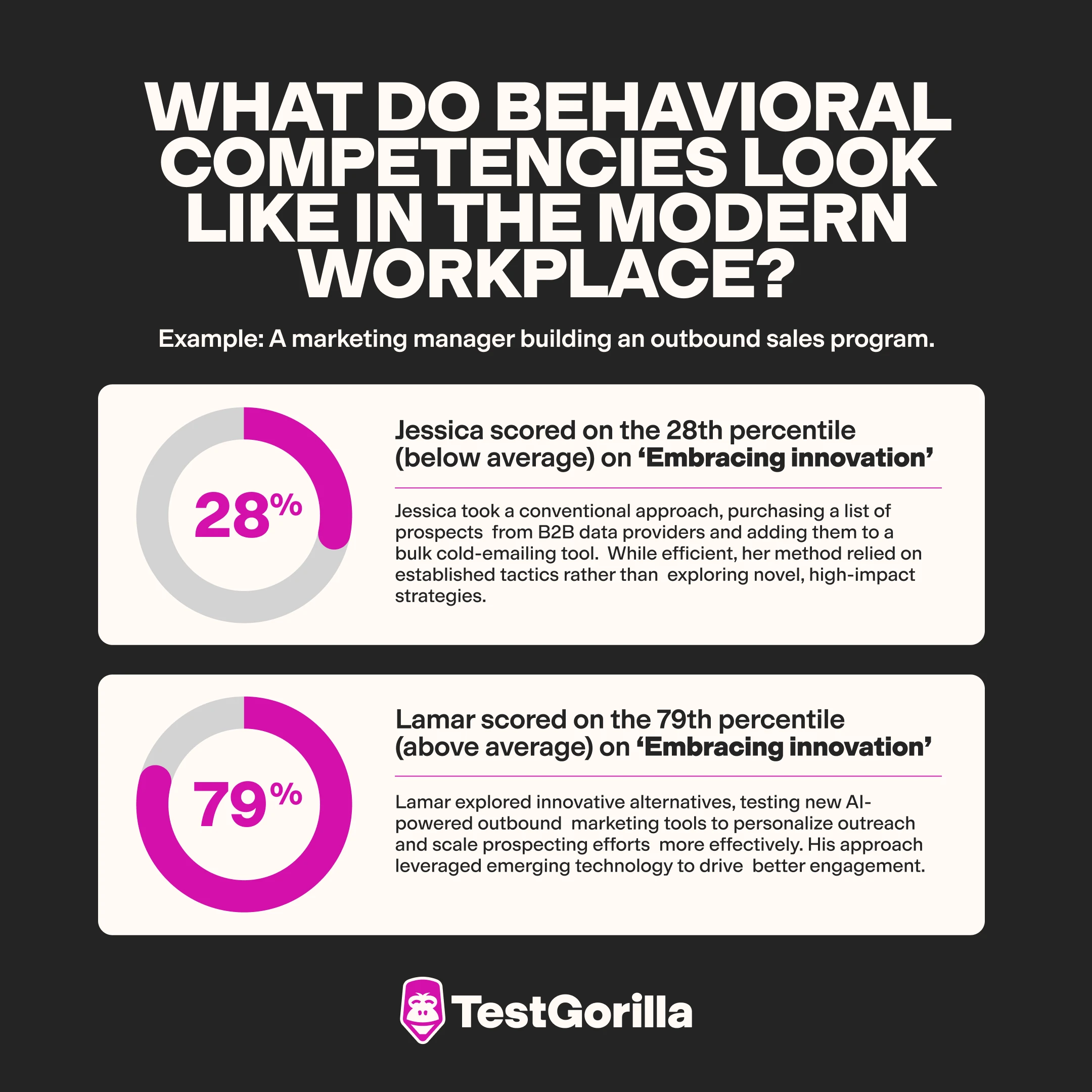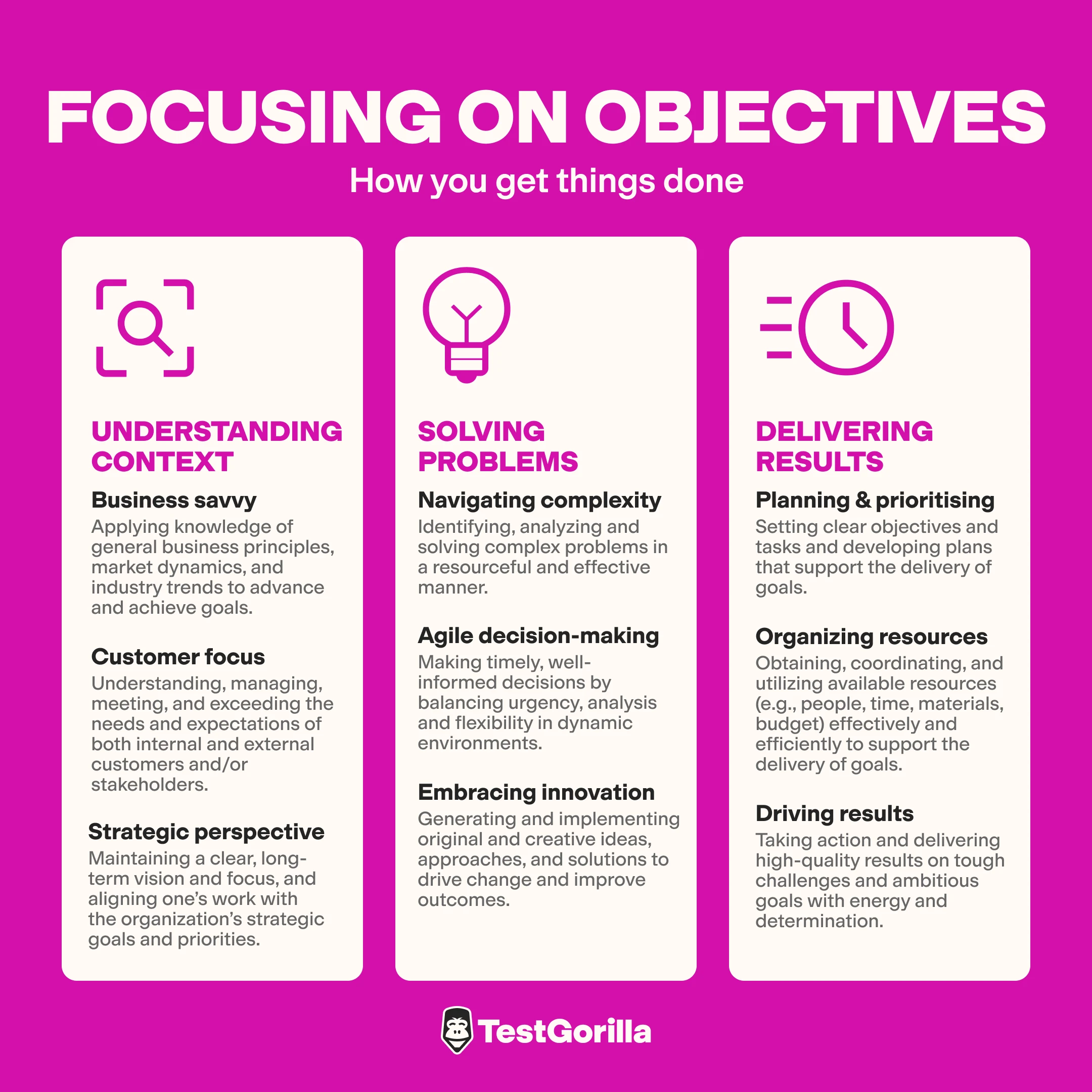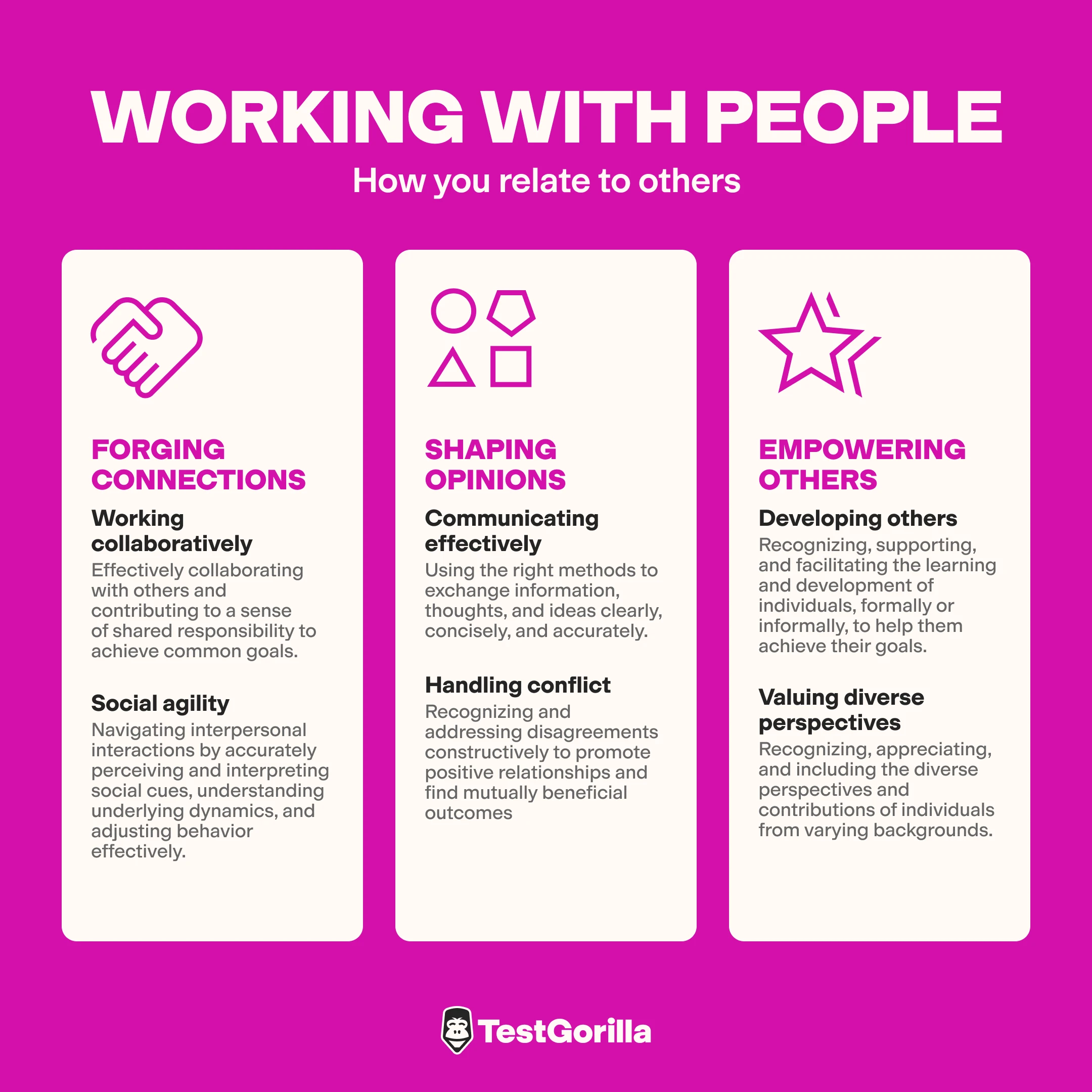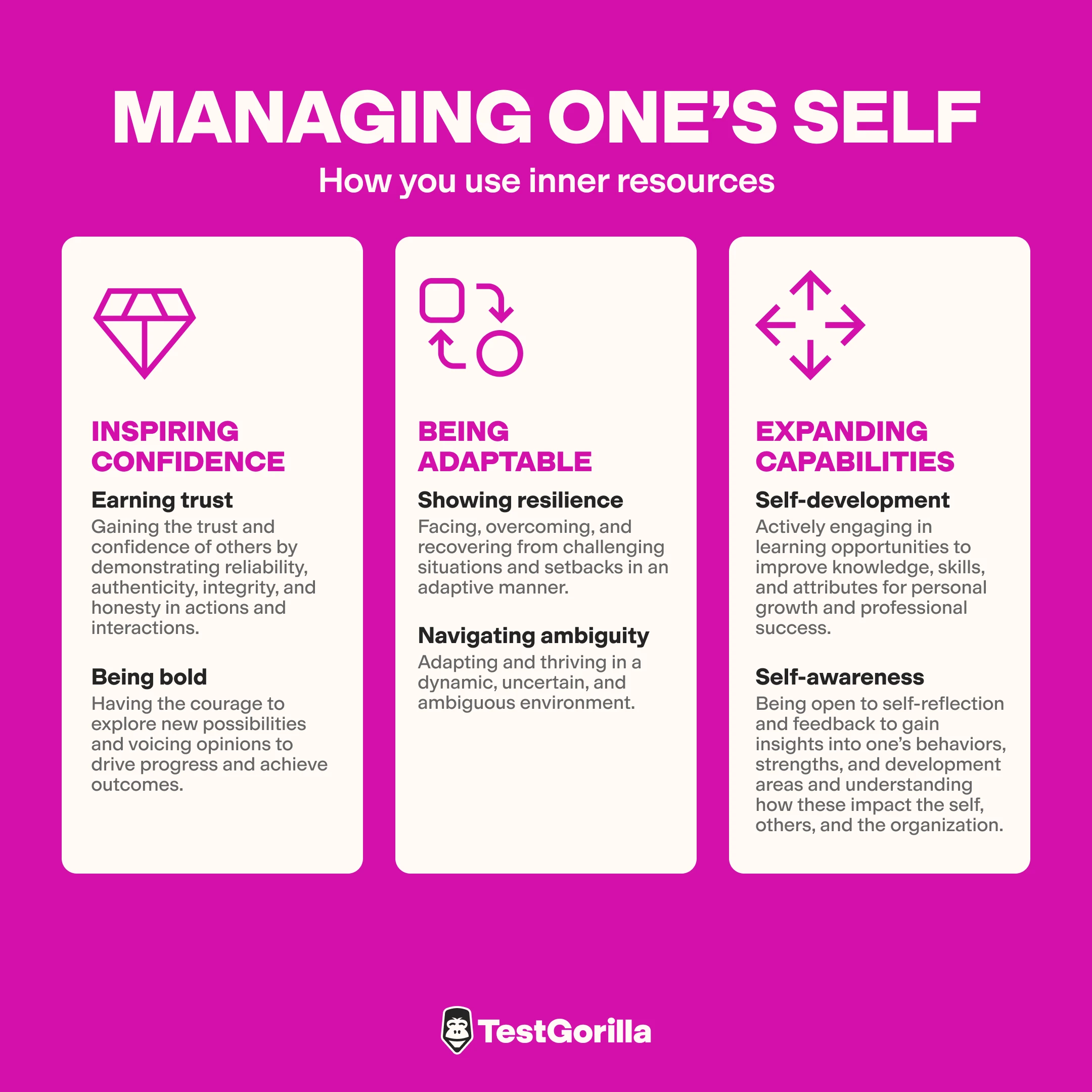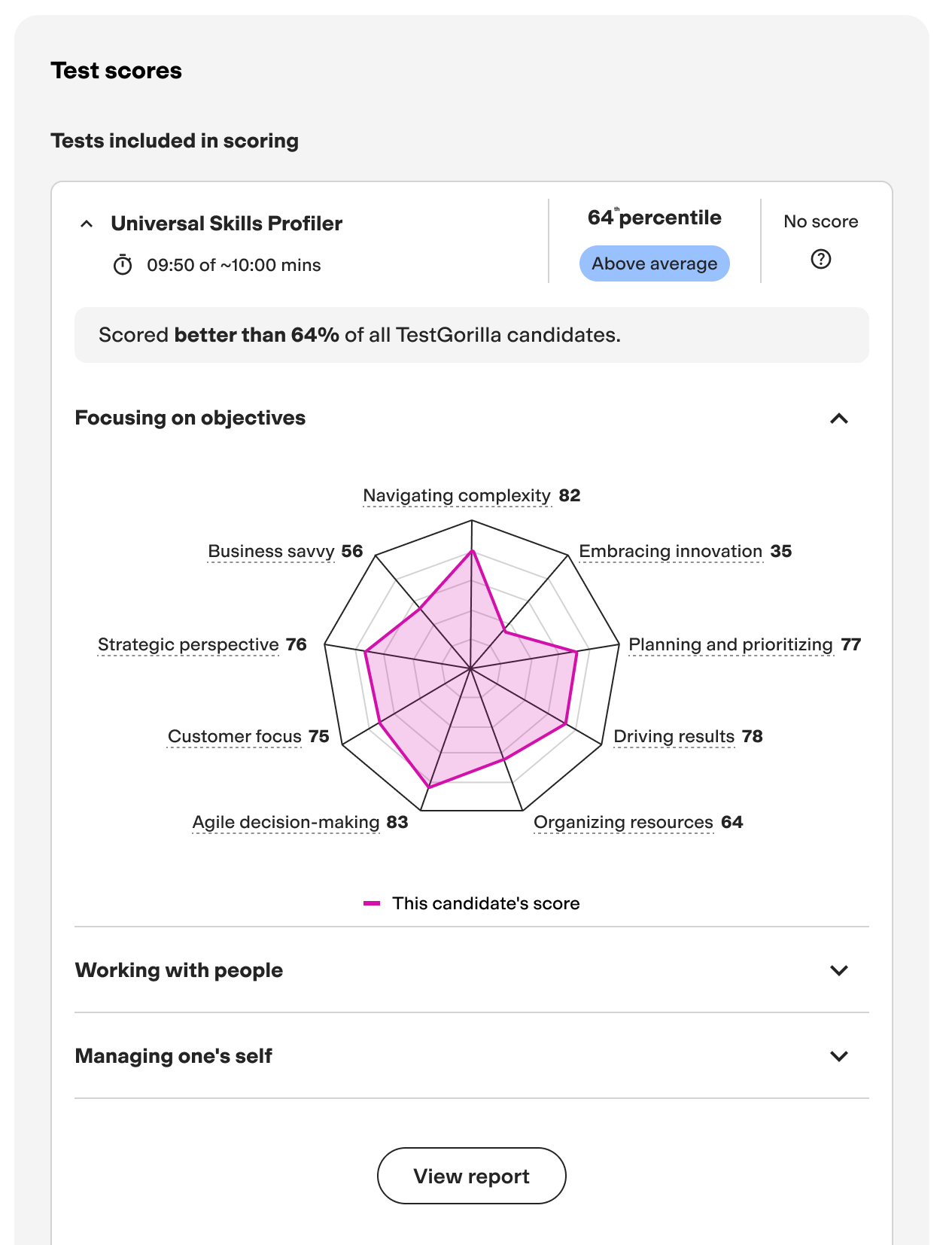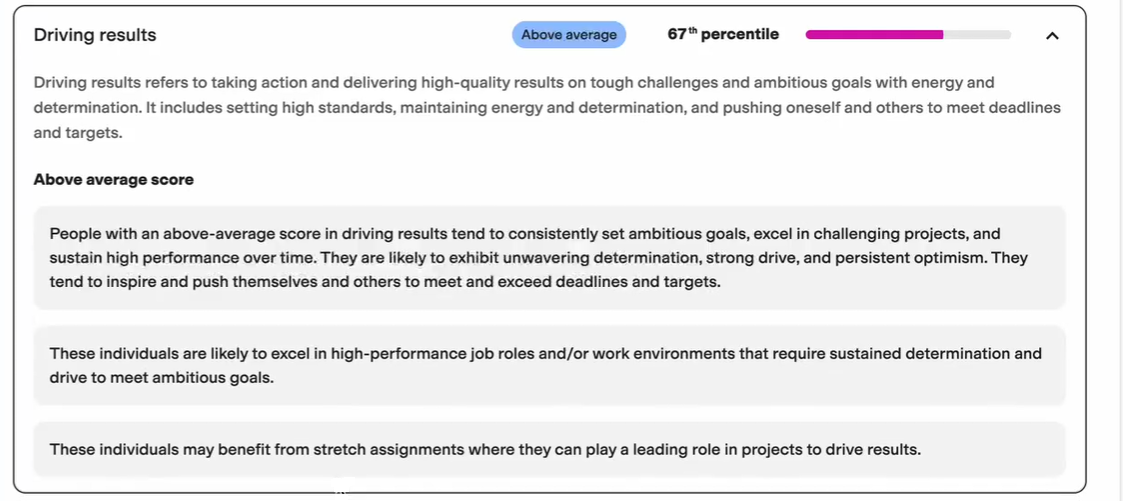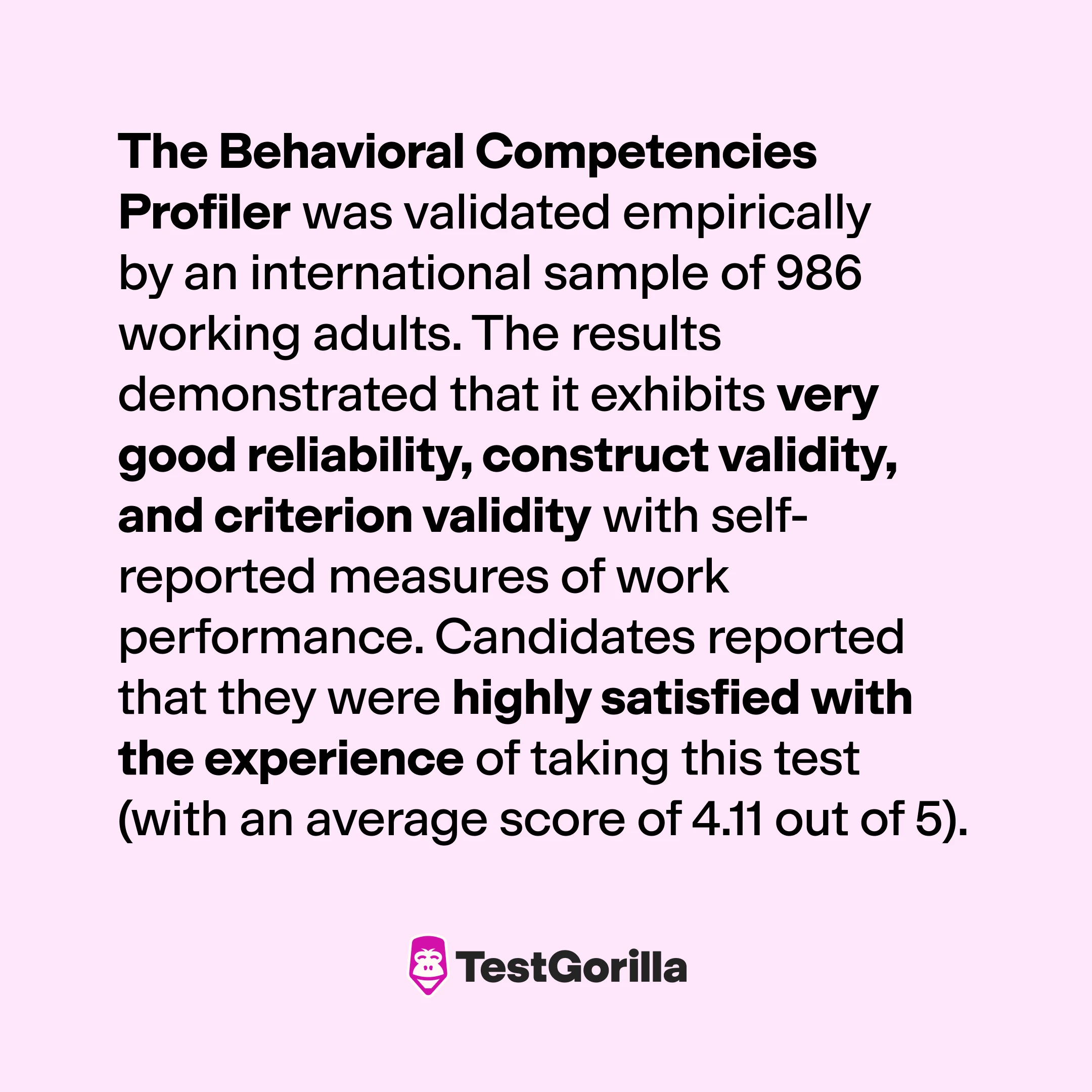Behavioral competencies: Why they matter and how to test for them using TestGorilla's Behavioral Competencies Profiler (BCP)
This blog post explains what behavioral competencies are, why they're important, and how to test for them. The Behavioral Competencies Profiler is in development and will be available to use soon. Click here to sign up for the wait list.
The modern workplace is often described as VUCA: Volatile, uncertain, complex, and ambiguous. To successfully navigate this challenging environment, organizations need employees whose knowledge, skills, and behaviors enable them to thrive in such contexts.
The accelerated pace of AI and digital transformation has made behavioral competencies like adaptability, resilience, and collaboration essential for success in any role. Thus, success in a job is no longer just about what you do – it’s about how you do it, too.
Increasingly, being a top performer involves approaching work in a certain way: Embracing innovation, working collaboratively, and navigating complexity. In this context, hiring people with the skills to do this successfully is a cornerstone of building teams that excel and lead your organization into the future.
TestGorilla’s new Behavioral Competencies Profiler is here to help you do exactly that. It’s designed to identify how candidates approach work in real life. For instance, it helps identify individuals who may be excelling in their roles now but may not be keeping up with industry changes. This enables you to make the future-looking choice to select a candidate who, while new to the role, demonstrates significant potential for innovation and rapid growth.
This blog post explains what behavioral competencies are, why they’re so important, and how to measure them with TestGorilla’s Behavioral Competencies Profiler.
Table of contents
- Key takeaways
- What are behavioral competencies?
- Why is assessing behavioral competencies so important?
- TestGorilla’s Behavioral Competencies Profiler
- How does the Behavioral Competencies Profiler work?
- The benefits of using the Behavioral Competencies Profiler in your hiring process
- Ready to start hiring for behavioral competencies?
Key takeaways
Behavioral competencies are critical for workplace success. These measurable, observable behaviors – like resilience, collaboration, and agile decision-making – are applicable and transferable across roles, industries, and job levels.
The Behavioral Competencies Profiler (coming soon!) offers a unique assessment approach. It evaluates 21 behavioral competencies across three key areas – Focusing on Objectives, Working with People, and Managing Oneself – to provide actionable insights for smarter hiring and employee development.
The Behavioral Competencies Profiler is efficient and scientifically validated. It quickly delivers a reliable and valid assessment of how candidates approach their work, making it easy for both organizations and candidates. The average completion time is 13 minutes, and the maximum completion time is 25 minutes.
Organizations can use it for more than just hiring. This is not just a hiring tool – it’s also a powerful resource for talent development. By identifying key strengths, growth areas, and leadership potential, it supports tailored onboarding, targeted learning and development plans, and effective career progression strategies.
Candidates can use it for personal growth and development. The Behavioral Competencies Profiler offers candidates crucial insights into their skills and behaviors, enabling them to recognize their strengths, identify areas for improvement, and uncover growth opportunities. This tailored feedback enhances self-awareness and promotes their professional development.
What are behavioral competencies?
Behavioral competencies are observable, measurable behaviors and skills required to perform effectively in any role. Examples of these skills include agile decision-making, planning and prioritizing, embracing innovation, working collaboratively, handling conflict, earning trust, showing resilience, and self-development.
They are applicable and transferable across roles, organizations, and industries. This is in contrast to technical expertise (“hard skills”), often only applicable in specific roles or industries.
For instance, while only software engineers need to know specific coding languages, everyone in the workplace needs to know how to communicate effectively. From intern to CEO, from startup to multinational conglomerate, from construction to cybersecurity, behavioral competencies matter.
When a new hire possesses exceptional behavioral competencies, it’s all good. Conversely, when they lack these skills, their absence is keenly felt – but often too late to address.
The best insights on HR and recruitment, delivered to your inbox.
Biweekly updates. No spam. Unsubscribe any time.
Why is assessing behavioral competencies so important?
There are several key reasons why employers need to assess behavioral competencies:
To enhance individual and team performance. Assessing behavioral competencies lets you hire for above-and-beyond contributions. By aligning these skills with job requirements during recruitment and evaluation, organizations ensure they hire capable and motivated employees to succeed, leading to top performance at individual and team levels.
To foster employee growth and leadership development. Behavioral competencies can be learned and refined over time, and organizations with tailored development plans can use behavioral competencies measurement to nurture high-potential employees and strengthen the leadership pipeline. A well-implemented standard for behavioral competencies gives employees clear pathways for professional growth, increasing engagement and retention.
To build collaboration and shape organizational culture. Communication, collaboration, and conflict handling are foundational for creating positive work environments. By evaluating and developing behavioral competencies, organizations can align their workforce with their core values and create a culture that promotes diversity, trust, and innovation.
Behavioral competencies keep organizations adaptable and competitive. Organizations can navigate uncertainty and maintain agility by identifying and equipping employees with the skills and behaviors needed to embrace innovation, navigate complex problems, and show resilience. Focusing on behavioral competencies means investing in the long-term success of your organization.
TestGorilla’s Behavioral Competencies Profiler
Behavioral competencies can be assessed through various tests and measurement methods, including competency-based interviews, situational judgment tests, assessment center exercises, simulations, work samples, and self-report questionnaires.
TestGorilla has developed a new assessment tool that assesses behavioral competencies comprehensively while ensuring scientific rigor and psychometric quality.
It’s called the Behavioral Competencies Profiler.
Unlike traditional assessments, which are often time-consuming and role-specific, the Behavioral Competencies Profiler evaluates a set of core behavioral competencies in just minutes. It saves time, makes shortlisting decisions easy, and helps your team focus on candidates with a higher chance of job success.
What is the Behavioral Competencies Profiler?
The Behavioral Competencies Profiler is a self-report questionnaire that evaluates candidates on 21 core behavioral competencies. These skills are crucial for the candidate’s ability to deliver on goals and expectations, forge connections, and adapt and grow across three skill clusters. Here’s a breakdown of each:
Focusing on Objectives
Working with People
Managing Oneself
The Focusing on Objectives skills cluster is all about how you get things done – that is, which behaviors help you accomplish your goals. This cluster covers skills such as identifying, analyzing, and solving complex problems (Navigating complexity), making timely and well-informed decisions (Agile decision-making), and setting clear objectives and tasks (Planning and prioritizing).
The Working with People skills cluster focuses on how you relate to others in the workplace – building, maintaining, and employing personal relationships to get things done at work. This cluster encompasses skills related to effectively collaborating with others (Working collaboratively), addressing disagreements constructively (Handling conflict), and supporting the development of others (Developing others).
The Managing Oneself cluster focuses on how you use your inner resources – how people harness inner strengths to grow and achieve stretch goals. This cluster consists of skills such as having the courage to explore new possibilities and voice opinions (Being bold), overcoming and recovering from challenging situations (Showing resilience), and actively engaging in learning opportunities (Self-development).
How does the Behavioral Competencies Profiler work?
The Universal Skill Profiler measures 21 core behavioral competencies. It presents candidates with a series of behavioral statements which ask them to rate statements ranging from “Strongly disagree” to “Strongly agree”. Their responses are scored and compared against a normative sample. Based on this comparison, a candidate’s score for each universal skill is described according to one of five score categories, ranging from well below average to well above average (relative to the norm group).
Try the Universal Skill Profiler interactive demo:
In practice, this means that a candidate who scores much higher on a given universal skill than people in the normative sample will be placed in the “very high” category; a candidate scoring somewhat higher than the normative sample will land in the “high” category, and so on.
The Behavioral Competencies Profiler report provides a detailed analysis of the person’s results for each of the 21 skills. The report:
Describes how the person is likely to demonstrate a specific universal skill in the workplace, highlighting their strengths and the tasks or situations they may find more challenging.
Identifies the types of environments and roles where the person is likely to thrive and perform successfully
Offers clear, actionable recommendations to support and facilitate the further development of the skill.
When candidates take a self-report assessment – also known as a preference test – there is a concern that they will fake their responses. The perception that faking is widespread often overshadows the reality – faking doesn’t affect the usefulness of test results as much as we think, and concerns about the reliability of self-report measures are usually unnecessary. Read more about that here.
How to interpret a Behavioral Competencies Profiler report
The best way to understand a person’s Behavioral Competencies Profile is to connect it to the requirements of the role you’re hiring for.
A high score on a skill might be more important in some roles, and less important in others – whether a score is “good” or “desirable” can be understood only in the context of a role (you can read more about that here). For example, demonstrating a strategic perspective is less critical for a CS agent than for a senior manager, so a low score in this universal skill would be less relevant for one role than another.
Overview of the candidate’s results on the Behavioral Competencies Profiler.
Example description of a universal skill in the Behavioral Competencies Profiler report.
What job roles is the Behavioral Competencies Profiler suitable for?
All job roles.
Outstanding performance entails more than just utilizing knowledge and skills. Leverage the Universal Skill Profiler to pinpoint candidates capable of consistently meeting objectives, nurturing relationships, and adapting their behaviors to achieve remarkable outcomes.
How was the Behavioral Competencies Profiler developed?
TestGorilla’s internal team of assessment experts developed the Universal Skill Profiler. The team comprises Industrial/Organisational (IO) psychologists, data scientists, psychometricians, academics, researchers, writers, and editors.
To develop our Behavioral Competency Framework, our team of IO psychologists identified, reviewed, and evaluated several major existing academic, governmental, and commercial models of factors contributing to job success beyond technical expertise (behavioral competencies, transversal skills, transferable behaviors, etc.). Then:
We synthesized these findings to identify a set of genuinely universal relevant skills across various roles, industries, and job levels.
Each skill was critically evaluated in terms of its current and future relevance, given the demands of the new world of work. To make it futureproof, the framework is designed to be modular, allowing for integrating new skills as workforce demands evolve.
For each universal skill, we identified specific behaviors and actions (i.e., behavioral indicators) that people of varying proficiency levels would display in the workplace. These levels range from an initiate level through developing, competent, and skilled levels, to expert-level demonstrations of the skill.
A second group of IO psychology professionals thoroughly reviewed the framework. Their recommendations were used to refine the framework, after which it was reviewed again to ensure consistency and alignment among the reviewers.
In the final review stage, the framework was evaluated by eight experienced professionals, including senior leaders, HR professionals, and people managers, ensuring its relevance and applicability across various roles and organizational contexts.
This qualitative research process ensures that our behavioral framework's structure, definitions, and indicators are content-valid, clear, and relevant to all end users, including candidates.
Based on our Behavioral Competency Framework, we next developed the Behavioral Competencies Profiler, an assessment tool to evaluate the identified behavioral competencies. Our team of I/O psychology experts also developed the Universal Skill Profiler and underwent multiple rounds of qualitative reviews to ensure measurement precision and alignment with the framework.
The Behavioral Competencies Profiler underwent a thorough empirical validation process using an international sample of 986 working adults. The results demonstrated that it exhibits very good reliability (Cronbach’s alpha ranging between .80 – .91), construct validity, and criterion validity with self-reported measures of work performance (validity coefficients ranging between .21 – .37). Furthermore, candidates reported that they were highly satisfied with the experience of taking this test (average score of 4.11 out of 5). The validation study results were used to refine further and deliver the Behavioral Competencies Profiler.
The benefits of using the Behavioral Competencies Profiler in your hiring process
1. Efficient and objective measurement of soft skills
The Behavioral Competencies Profiler enables organizations to assess 21 different behavioral competencies. With an average completion time of 13 minutes (and a maximum completion time of 25 minutes), it ensures efficiency without compromising reliability or validity. By offering a scientifically rigorous measurement of soft skills, the Behavioral Competencies Profiler takes skills-based hiring to the next level, making it easier to identify candidates equipped to succeed in today’s dynamic workplace.
2. Universally applicable across roles
The universal nature of the skills assessed by the Behavioral Competencies Profiler makes it a versatile tool suitable for virtually any job, from entry-level to more senior roles. Whether you’re hiring for customer-facing, technical, sales, creative, or other positions, the Behavioral Competencies Profiler provides actionable insights into behaviors and skills that make a difference.
3. A critical component of multi-measurement assessments
The Behavioral Competencies Profiler fills a unique gap in multi-measurement hiring processes by assessing how candidates approach their work. While hard skills tests evaluate what candidates can do, and personality or culture fit tests assess preferences, the Behavioral Competencies Profiler offers a novel perspective on how candidates behave in the workplace. This qualitative difference makes it a powerful complement to other assessments, enabling a more holistic evaluation of potential hires.
4. Rich and descriptive reports for decision-makers and candidates
The Behavioral Competencies Profiler generates detailed reports providing clear, actionable insights for organizations and candidates. For decision-makers, the reports outline candidates’ strengths, challenges, and behaviors in the workplace, helping to guide hiring decisions. For candidates, the reports highlight their current capabilities and suggest development opportunities, fostering self-awareness and growth.
5. Future-of-work focus
In today’s volatile and rapidly changing world of work, the Behavioral Competencies Profiler assesses skills that are relevant today and critical for the future. By focusing on delivering outcomes, resilience, collaboration, and other future-proof skills, it helps organizations build teams that are equipped to navigate ambiguity and embrace innovation. This is as important as ever in the volatile, uncertain, complex, and ambiguous world of work today.
6. Inform and enhance your interview process based on the Behavioral Competencies Profiler’s insights
By administering the Behavioral Competencies Profiler before your interviews, you can use its insights to validate and dive deeper into a candidate’s strengths and weaknesses. It adds a layer of insight, saving you time by evaluating qualities that would otherwise require interview time to assess. This makes for more contextual interviews and, ultimately, better decision-making.
7. Inform onboarding and learning and development plans
More than this, the Behavioral Competencies Profiler provides a great way to assess the strengths and development needs of new and old hires and tailor a plan to their needs. More than just a hiring tool, the Behavioral Competencies Profiler can help your organization identify needs for targeted training in the workforce, facilitating career growth and internal mobility. With targeted development of crucial workplace skills, employees gain confidence and feel more engaged.
Ready to start hiring for behavioral competencies?
In today’s dynamic workplace, hiring for behavioral competencies is no longer optional – it’s essential. TestGorilla’s Behavioral Competencies Profiler empowers organizations to make smart, holistic hiring decisions, build adaptable teams, and unlock the full potential of their workforce.
The Behavioral Competencies Profiler will be available to use soon. Click here to sign up for the wait list.
You've scrolled this far
Why not try TestGorilla for free, and see what happens when you put skills first.


